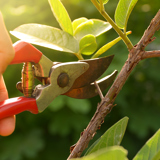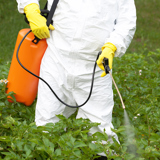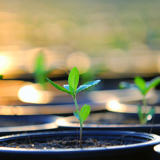- Baked Goods
- Bones
- Bread
- Cereal
- Cheese
- Coffee Grounds
- Dairy products
- Eggs and Eggshells
- Fish
- Fruits
- Gravy and Sauces
- Nuts
- Pasta
- Peanut Butter
- Pizza
- Processed Foods
- Rice
- Salads
- Sandwiches
- Spoiled or Mouldy Food
- Vegetables
Composting
Interested in creating your own compost? Composting saves waste and provides rich fertilizer.
Composting is the natural process of 'rotting' or the decomposition of organic matter by microorganisms under controlled conditions. Compost is beneficial for the land in many ways. It works as a soil conditioner, a fertilizer, and as a natural pesticide. It also adds vital humus or humic acids to soil. Composting produces a rich soil supplement which improves plant growth.
In ecosystems, compost is useful for erosion control, land and stream reclamation, wetland construction, and as landfill cover.
You can purchase a composter at the County office for just $60.00. Visit us during regular business hours or call (780) 864-3760 for more information.
“Many County residents, especially rural residents, are already aware of the value and benefits composting and are engaged in the process on their farms. We're hoping to encourage residents who may not be aware of the benefits of composting to get started,”
- Darren Lubeck, Manager of Environmental Services
What can I put In my composter?
- Coffee Filters
- Facial Tissue
- Greasy Pizza Boxes
- Paper Bags
- Paper Napkins
- Non-Coated Paper Plates
- Paper Towels
- Tea Bags
- Small Paper Items
- Plain White Tissue Paper
- Flowers
- Grass Clippings
- Houseplants
- Leaves
- Plant Trimmings
- Small Branches (no larger than 4 ft in length and 4 in in diameter)
- Weeds
- Pet Hair
- Wooden Chopsticks
- Stir Sticks
- Popsicle Sticks
For more information on composting in Saddle Hills County, contact our Environmental Services Department at (780) 864-3760 or email EnvSvcs@saddlehills.ab.ca
More Information:
Contact Us
Saddle Hills
Junction of Hwy 49 & Secondary Hwy 725
RR1, Spirit River AB
T0H 3G0
T. 780-864-3760
Fax 780-864-3904
Toll-free 1-888-864-3760
frontdesk@saddlehills.ab.ca
Sign up to our Newsletter
Stay up to date on the Saddle Hills activities, events, programs and operations by subscribing to our eNewsletters.




